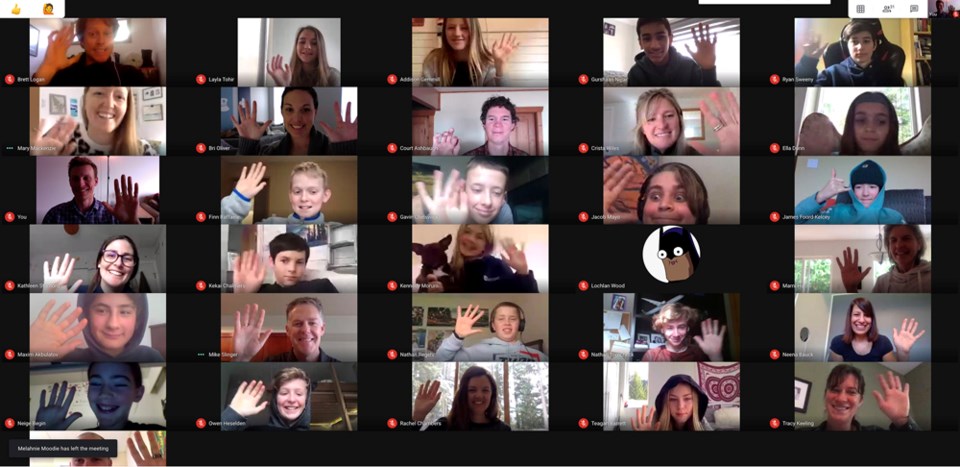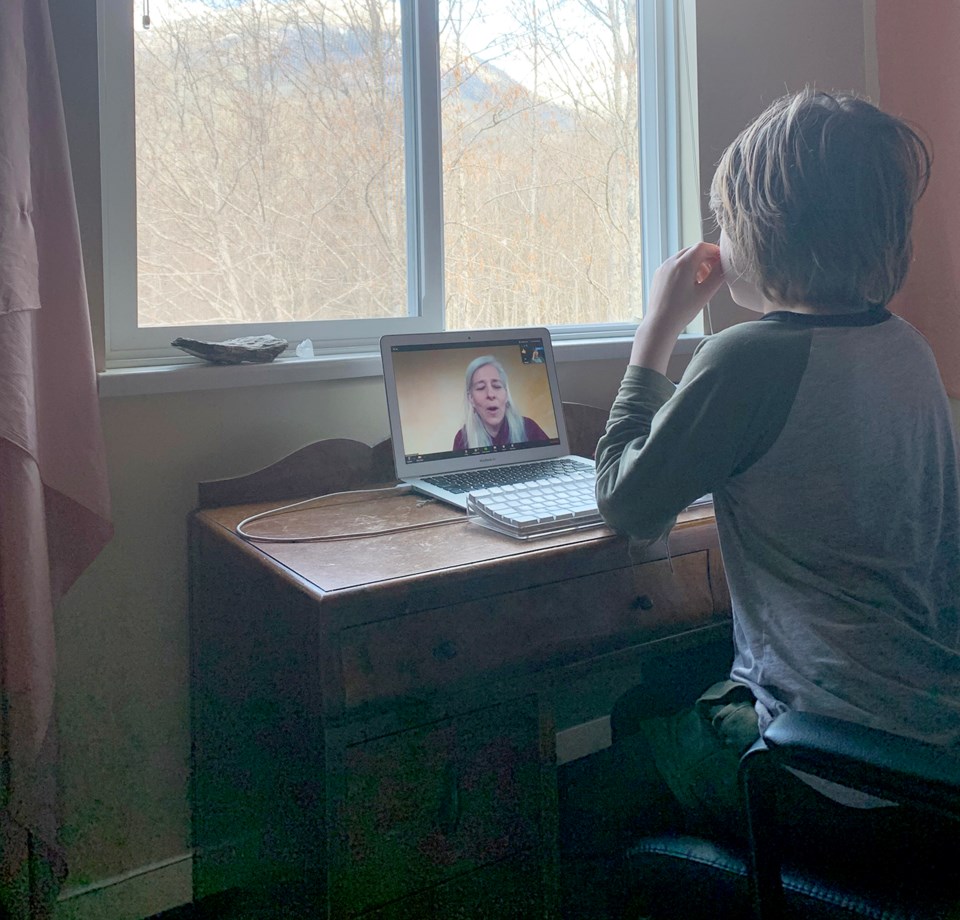School's out, but class is still in for students in Squamish.
In mid-March, during spring break, the provincial government announced it was not going to allow in-class learning for all 550,000 kindergarten to Grade 12 students in СŔ¶ĘÓƵ to help stop the spread of COVID-19.
Since spring break ended, students, teachers, and staff at Squamish's schools have been navigating new and creative ways to educate their students.
All of the school representatives The Chief talked to say the priority is to connect with students and keep them learning during these challenging times.
Most too, have moved to online platforms, such as the video conferencing software, Zoom.
Waldorf
At Squamish Waldorf, school founder and Grade 6/7 teacher Christine Martin has dropped off binders at each of her student's doors for them to work on at home.
She does a Zoom, video-conferencing call with her students each morning.
"The whole class gets to see each other," she said, adding she starts the call 10 minutes early so the kids can socialize, just as they would before a regular class would start at school. The students take turns telling a joke each day to start the lesson.
"It is actually going much better than I expected," Martin said.
The students work through the academics in the binder and have assignments for the remainder of the day, after the call.
Martin has given her students a suggested schedule to help them find a rhythm in their day.
She schedules them some physical activity after the call, followed by more course work, then more physical activity, reading or art.
She also encourages students to set chore goals to help out at home.
Every Monday, she goes and picks up the binders, marks them and returns them.
She tells students that a rhythm, healthy lifestyle, kindness and patience is what will help get through the challenges of the pandemic.
Martin says parents don't need to feel extra pressure over suddenly have their children in the house a lot more.
"I told them, you are not responsible for your children's education, I still am. You don't have to home school. I have got it," she said.
Gabriel Alden Hull, principal at Waldorf, said that maintaining the personal connection with students is a priority for all the teachers at the school.
At Waldorf, students don't change teachers year-over-year, so the bond was significant prior to COVID-19.
Lessons are adapted for the age and level of development of each student, as well as parent preference.
In early grades, there are no Zoom meetings; instead, teachers have been sending home stories, song recordings, recipes, and chore charts.
Montesorri Sound Cloud lesson
Montessorri
When The Chief caught up with Catrin Webb, the director of education at Squamish Montessori, she had just come off the school's first Zoom meeting with their 36 upper elementary students.
"It was interesting," she said, with a chuckle.
The school is utilizing Zoom and Google Classroom to keep their students learning while away from the physical classroom.
The Google Classroom isn't being used just for assignments but as a resource.
"The students can go in under their classroom, they can log in to a subject like math or history or geometry, and in there, are a whole bunch of resources that children can either print or have their parents print, and links they can go to and then they have a bit more free choice within their subject areas," she said, adding that teachers set expectations for the kids.
A positive of the switch to online tools is that it sped up something that was already happening, Webb said.
"We were planning to transition to Google Suite and Google Classroom for next year anyway, in a smaller capacity, so it is brought to light that," she said, adding that the teachers have been making engaging how-to videos and lessons, all of which will be a database of resources that can be accessed by families anytime.
Montessori teachers are working from their classrooms in the mornings, she said. Given that it is a large new school, with only four teachers, they can maintain social distancing, she said.
"Because we are Montessori, we really need the materials to be able to show students lessons in the classroom. The classrooms are prepared environments which we work so hard to prepare," she said.
A few students are coming to the physical school, because their parents are frontline workers, but they too, can easily social distance.
"They have separate workspaces, they wash their hands lots and because their parents are involved in the medical field, they are pretty well-versed in what they need to do," she said.
Ěý
Montessori video
Coast Mountain Academy

Coast Mountain Academy's head of school, Mike Slinger, told The Chief the school's students already used Google Classroom, so switching to using it from home was pretty seamless for the 15 staff, 11 faculty members and 90 Grade 7 to 12 students.
The teachers and students are now also using Google Meet, the video-conferencing software.
"The magnitude of the shift has been significant," he acknowledged.
He said there is also humour that comes from the situation. Some teachers have made fun videos, with even Slinger making one showing himself working on the couch and getting juice from the fridge, he said with a laugh.
"We are trying to balance the humour and light-heartedness with getting through a proper meeting, but we are learning those routines as we go."
He said seeing some of the kids' online setups has been interesting too.
"Some of them look like they are in a sound studio because they are all set up with these gaming setups, he said.
Slinger said connecting with the kids socially and emotionally goes a long way to combating the fear and strangeness of the pandemic situation.
"What we saw early on is how much students wanted to be connected," he said.
Teachers have had meetings with their classes to stress while they are physically apart, they are not alone.
"We went around and shared our stories, and what they are grateful for — what has been going on; just trying to be really authentic and as the adults, modeling that behaviour. It is not just 'Carry on as usual.' we recognize that this is very different and most kids are probably experiencing some level of anxiety."
All the students are also being sent a social, emotional survey to see how they are doing. It asks things like how much screen time students are logging, how much sleep they are getting and the like.
"Just to get us some baseline data and try to identify anyone who might need more support right now," he said.
Starting this week, each day students will start with an hour of physical activity.
"We have always done PE early in the day for every student, so our PE department will be establishing helpful videos," he said, adding the videos will be made by the teachers.
With Grade 12's graduation ceremony planned for June, no definitive plans have been made yet, he said.
The faculty has met with the Grade 12s to hear their concerns.
"It is a really unfortunate spot for the Grade 12s to be in," Slinger said. "Not only are they anxious about finishing the year strong and having their academics and the grade points that they want to be able to get into the university programs, but they also don't know if this is impacting universities in any way."
He said a few students have received acceptance letters the past few days, which has been heartening.
Financial pressures
Unlike public schools, the leaders of Squamish's private and independent schools depend on tuition from parents, who during the pandemic, may not be working.
"We are keeping the children learning and trying to keep our teachers employed," said Webb, of Squamish Montessori. "Unfortunately, we have had to lay off our assistants."
Webb added it has been heartbreaking to see some families' situations caused by COVID-19.
"We are just doing our best with tuition and with everything else to accommodate families and support them the best we can."
The independent school representatives, like Webb, and Waldorf's Martin said they are hoping the government will come through with some funding for independent schools to help them through this time.
Sophie Demers, a Grade 7 immersion teacher at Don Ross Middle School.
School District 48
Nina Jakobsen, an Indigenous student success advisor at Howe Sound Secondary and Don Ross Middle School, says that creative ideas have been put in place to assist the approximately 110 students she works with.
Like most in town, students' classes are moving online.
In the first week after spring break, Jakobsen was connecting with students to make sure that they had the necessary tools and even food to proceed.
Some families are in distress, with shifting incomes and situations. Students may be working more or helping with siblings to pick up the slack, she said.
But so far, she is impressed with how students have been able to adapt.
"Time will tell," she said, adding she will be connecting with students one-on-one and providing any support needed to get through coursework.
"We have to prioritize the grads and students most at risk of not passing something," she said.
She and Indigenous support worker John Hamel will be hosting live video chats from the First Nations resource room at Howe Sound — a classroom that is set up with space for tutoring, socializing and other supports for students.
Every day from 12 p.m. to 2 p.m., one of them will be in the room via video and students will be able to see each other and reach out for help or information, if needed.
Emotionally, she said students don't seem as tense or fearful as adults about the virus.
"The isolation is challenging for some — teenagers want to be with their friends — so that can be hard, but I think so far, I haven't been seeing a lot of fear," she said.
On an upside, some students who are anxious about going to school may do better with the primarily online schooling, she said.
"One thing that I am hopeful about is that with some students, just showing up at school and being in a classroom is really anxiety-provoking. So, with that issue removed, I am wondering if we are going to see some students excel who were struggling before? Maybe this is the medium they are better suited to?"
Online communication can be quite bonding as well, she noted, adding that seeing each others' surroundings and talking about, say, the poster on the wall behind the student, can create more connectedness.
In terms of graduation this year for public school students, Chris Nicholson, Sea to Sky school district assistant superintendent, told The Chief that there are various options for the commencement ceremony, including postponing it until fall.
But that decision has yet to be made.
"We know that this is a super important milestone in their lives, and, boy, the teachers and everybody else sure looks forward to being a part of that," he said.
At this point, the school administration is going week-to-week, watching and listening to the provincial health officer and the directions being given for educators.
"We can always be hopeful, however, if it comes to pass that a traditional grad ceremony is not in the cards because we are not allowed to be together, there are already so many ideas floating around what a virtual grad could look like," he added.




